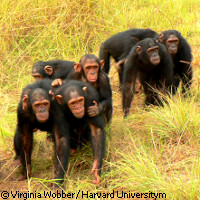Young-at-heart bonobos will always share
Humans could stand to learn a thing or two from bonobo apes about what it means to be unselfish. Unlike other primates, bonobos will always share, even when food is involved, two new US-based studies show. The research findings, which are part of the EU-funded TWOPAN ('Genomic and phenotypic evolution of bonobos, chimpanzees and humans') project, are presented in the journal Current Biology. Researchers recognise that humans as well as other primates, especially chimpanzees, become increasingly selfish they older they get. Bonobos do not. And what is particularly intriguing about their altruistic behaviour is that it is natural, unlike that of humans who need to be trained to share. In these latest studies, the researchers from Duke University in North Carolina and Harvard University in Massachusetts found that while bonobos have seemingly never learnt to be selfish, chimps will do whatever it takes to get what they want - even if it means having to show a nasty side of themselves - as they get older. The researchers measured food-sharing and social inhibition among bonobos and chimps living in two African sanctuaries: the Tchimpounga Sanctuary in the Republic of the Congo and the Lola ya Bonobo sanctuary near Kinshasa, Democratic Republic of the Congo. According to the researchers, developmental patterns that represent the historical lifestyles of these two apes could be responsible for the differences in their behaviour. The bonobos and chimps were paired and placed in an enclosure with some food at Tchimpounga, where the researchers found that younger bonobos and younger chimps were willing to share food, but older chimps were not. At Lola ya Bonobo, bonobos were given a food pile to themselves while a fellow bonobo watched from behind a gate. In keeping with the bonobo tradition, they chose to open the gate and share their food with their friend. 'A chimp would never voluntarily do that,' explained co-author Professor Brian Hare from the Department of Evolutionary Anthropology at Duke University. 'Chimps will do things to help one another, but the one thing they will not do is share food.' Bonobos give the impression that they live in 'a sort of Peter Pan world', he said, adding that, 'they never grow up, and they share.' The researchers speculate that bonobos are unselfish because of the relative abundance of their environment. Unlike chimps and gorillas that compete daily for food, bonobos do not have to. 'It seems like some of these adult differences might actually derive from developmental differences,' explained Harvard graduate student Victoria Wobber, lead author on one of the papers. 'Evolution has been acting on the development of their cognition.' When it comes to asking others for handouts, chimps have the ability to do so quickly while bonobos have room for improvement. Harvard professor and co-author Richard Wrangham said younger chimps must learn to determine which particular adult they can appeal to because chimps live in a society where hogging the food pile is a privilege of rank. This does not mean that bonobos are dim-witted; it just means that bonobos are not as experienced in knowing which ape to approach to beg for food, and when. The TWOPAN project has received over EUR 2 million under the European Research Council (ERC) Advanced Grant area of the Seventh Framework Programme (FP7). Due to end in 2014, the five-year project is being carried out by the Max Planck Society for the Advancement of Science in Germany.
Countries
United States



